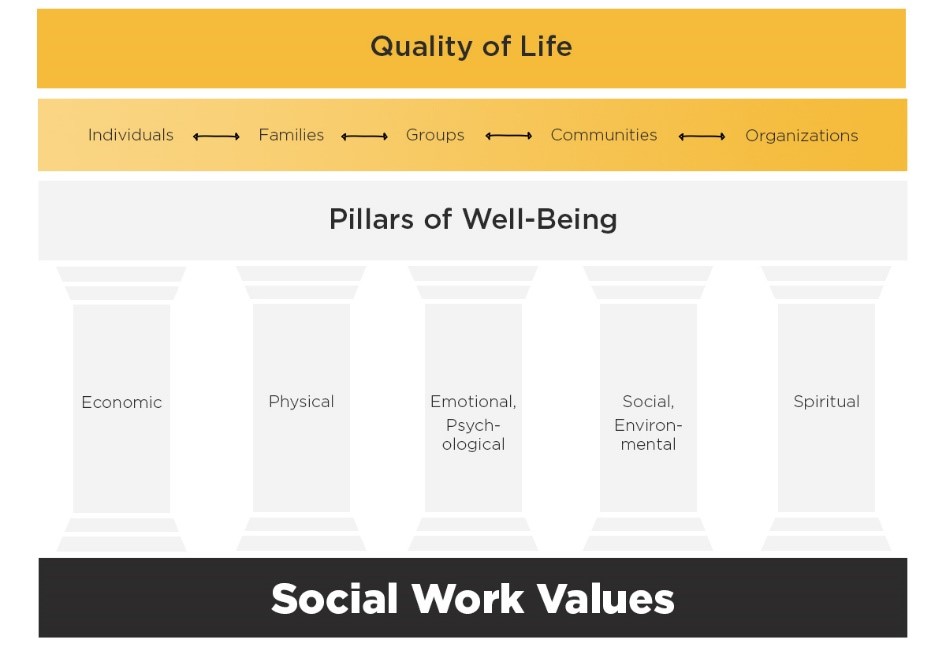Program Overview:
The MSSW program at the College of Saint Rose prepares students as practitioners by providing both generalist and specialist knowledge in the area of health and well-being and the skills to engage with individuals, families, groups, organizations and communities as an agent and facilitator of change. Grounded in scientific inquiry and using specialized skills and interdisciplinary knowledge, graduates will be prepared to practice with a commitment to social work values. The program will promote justice, respect for diversity and ethical decision making in practice, policy making and service delivery in order to improve the well-being of the greater community and its diverse members and constituencies. Building on social work values and the generalist model the program believes that at the core of optimal functioning is health and overall wellbeing. The MSSW Program at the College of Saint Rose is an Advanced Generalist Program with focus on Health and Wellbeing.
In daily life that optimal quality of life is undermined when members of our communities cannot or do not have access to economic, physical, emotional/psychological, social/environmental and spiritual domains of well-being – the “pillars” of well-being.

Understanding that socioeconomic determinants of health, marginalization and poverty dramatically impact well-being within our own community, the program is designed specifically to train students to intervene in the infrastructure of communities and the challenges of daily living that impede quality of life. It is only by creating, restoring or stabilizing these “pillars” of well-being that we can aid our constituencies – individuals, families, groups, organizations and communities – in meeting their full potential and the professions purpose of promoting human well-being. Teaching concepts, models and interventions that support economic, physical, emotional/psychological, social/environmental, and spiritual wellness will allow our graduates to be skilled in developing, supporting and restoring these vital pathways to quality of life. We focus on what we can do to improve lives, prevent crisis, build community, reject marginalization and promote equality and understanding. This includes taking a proactive interest in the lives of communities and therefore always tending to the continuum and fluidity between micro and macro practice, serving not just individuals families and groups, but also organizations and communities.
The Program Goals of the MSSW Program are:
1. To educate generalist practitioners who can identify and meet the varied needs of the community and its diverse constituencies by engaging in practice across the micro, mezzo and macro levels.
2. To educate competent practitioners who can apply ethical principles and critical thinking to promote well-being and health using research-informed practices.
3. To offer flexible program options, both through classroom learning and field placements, that expand opportunities for both traditional and non-traditional students to enter the social work profession.
NOTE: As per CSWE standards, The College of Saint Rose does not grant social work course credit for life experience or previous work experience.
Program Contacts:
Janet Acker, Ph.D., LCSW-R
Social Work Graduate Program Director
Email: ackerj@strose.edu
Maureen Rotondi, LCSW-R
Social Work Department Chair
Email: rotondim@strose.edu
Program Webpage: Social Work M.S.
Program Requirements:
A grade of B or higher is required in all courses for both the Two Year and Advanced Standing programs.
Two Year Program (62 Credits)
Students who enter the two-year MSSW program at the College of Saint Rose complete 62 credits of course and field work to complete the degree. Most students attending full-time will complete their degree over four semesters. Part-time students, however, may complete their degree over a three- or four-year period.
Advanced Standing Program (31 Credits)
Students who enter the Advanced Standing program without Psychopathology, or a comparable course, will be required to meet this pre-requisite, either before matriculation or during their Advanced Standing studies. Psychopathology may not count as an elective in the program.
Internship/Field Experience/Service:
The 62 credit MSSW requires a field practicum in each academic year. In the first generalist year the practicum is at least 400 hours. In the second specialist year the field practicum is at least 500 hours.
The 31 credit Advanced Standing MSSW requires a field practicum of at least 500 hours over the course of the academic year.
In the field practicum, under the supervision of social work field instructors, students put classroom learning into practice, and then reflect on their practice in the community. The result of the reflective practice – the cognitive and affective processes that are by nature part of field practice - brings about change and improvements in skill, deepening of knowledge, transformation of values. An essential aspect integrated into the practicums, is one hour per week of group supervision with faculty. This faculty led discussion and processing of field experiences and commonality, further leverages the relationship between classroom and field and further connects faculty with field practicum sites.
Culminating Academic Experiences:
Required Courses
| SWK 622 | Admin Pract & Ldrshp in SWK | 3 |
| SWK 690 | Specialized Field Practicum 2 | 5 |
Professional Accreditation:
The College of Saint Rose, sponsored by the Sisters of Saint Joseph of Carondelet, Albany Province, is chartered by the Board of Regents of New York State. All of its degrees and programs are registered and its professional programs are fully approved by the Board of Regents through the New York State Education Department. The MSSW Program prepares students for LMSW licensure with the New York State Office of Professions.
The College of Saint Rose is accredited by the Middle States Commission on Higher Education, 3624 Market Street, Philadelphia, PA 19104 (267-284-5000). The Middle States Commission on Higher Education is an institutional accrediting agency recognized by the U.S. Secretary of Education and the Council for Higher Education Accreditation.
The Social Work program is in Candidacy status with the Council on Social Work Education, and should attain full accreditation by 2020.
$name
Additional Social Work Admission Information:
A grade point average of 3.2 (on a 4.0 scale), overall and in the undergraduate major.
Find Out More: